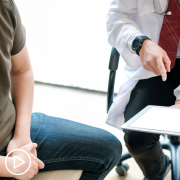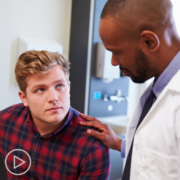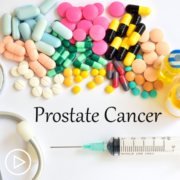Advanced Prostate Cancer Clinical Trials | Why Black and Latinx Participation Is Vital
Advanced Prostate Cancer Clinical Trials | Why Black and Latinx Participation Is Vital from Patient Empowerment Network on Vimeo.
Why is advanced prostate clinical trial participation important for Black and Latinx patients? Expert Dr. Yaw Nyame with the University of Washington explains how clinical trial participation helps patients and solutions toward removing barriers to participation.
See More from [ACT]IVATED Prostate Cancer
Related Resources:

Prostate Cancer Screening and Outcomes | Impact of Racial Disparities |
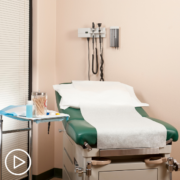
Understanding the Role of a Digital Rectal Exam in Prostate Cancer Care |
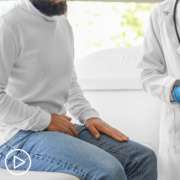
|
Transcript:
Lisa Hatfield:
Dr. Nyame, the importance of clinical trial participation can’t be underscored enough in cancer care. Can you speak to advanced prostate cancer clinical trials specifically for Black and Latinx men, and critically important, how are you and your colleagues removing barriers to accessing care and underrepresented communities, including the access to those clinical trials?
Dr. Yaw Nyame:
Yeah, I can’t state this enough. Clinical trials are a form of high-quality care, and I think a lot of people don’t understand that clinical trials don’t just test you in a vacuum with something that we think is really promising versus nothing at all. Clinical trials often are going to test a standard of care, so what we do currently versus something standard of click care and something that we think has benefit, and so at the very least, when you participate in the clinical trial, you are going to get what we think works best currently.
And then there’s the additional benefit that you might get something that we think works a little bit better or a lot better than what we do currently, and you do it in a space where people are monitoring you really closely, right? Because the clinical trial needs to collect data and understand how things work and how well they work. So it is a form of really high quality care, and I urge Black, Latino, and other minoritized patient populations to find ways to get access to this really high quality care. Now, what we have to do as medical institutions, as cancer center, is figure out ways to remove the barriers that limit people’s ability to participate in clinical trials.
Those barriers are usually social barriers, right? It is the, do I have the ability to take off time from work to participate in this trial? How’s this going to affect my household if I’ve got to come in my case to Seattle and take a whole day off from work to participate? Can I afford transportation to be coming to the cancer center every week? You know, do I have child care to participate in this trial? And so we as cancer centers are starting to think more holistically about how we can remove social barriers to clinical trial participation. And I do think until we get that right a lot of the inability for marginalized and minoritized populations to participate in clinical trials falls at our feet. So what are we doing to address barriers? Well, I think we’re trying to think about ways of putting clinical trials directly in communities.
So some of those social barriers are removed so that it’s not always on the patient to come to us. We’re thinking of ways to support those patients that have to absolutely come to us for a variety of reasons for a clinical trial so that there isn’t that financial and social burden. But it’s very much a work in progress. And I think we’re really in the early phases of understanding how we can support people. My activation tip when it comes to clinical trials and prostate cancer is to ask for them and to demand opportunities to participate in them because they are such high, they’re such incredible forms of high quality care.
And I think by participating in a clinical trial, you’re giving yourself and future versions of yourself and your community opportunities to have better outcomes when it comes to these cancers. And I think the second portion of that is to demand and ask from your cancer centers that they find ways to support you in participating in those clinical trials. Because as a cancer center and as an academic clinical institution, our mission is to serve. And we do have resources that we can sometimes make available to make sure that you can afford to and not be put out by participating in a clinical trial.

